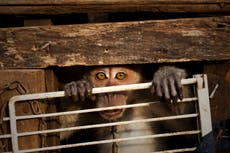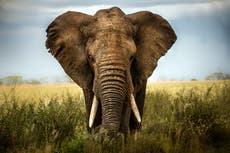Dozens of mammals including pigs and horses could be susceptible to coronavirus, study shows
‘The animals we identified may be at risk of outbreaks that could threaten endangered species or harm the livelihood fo farmers,’ say researchers

Your support helps us to tell the story
From reproductive rights to climate change to Big Tech, The Independent is on the ground when the story is developing. Whether it's investigating the financials of Elon Musk's pro-Trump PAC or producing our latest documentary, 'The A Word', which shines a light on the American women fighting for reproductive rights, we know how important it is to parse out the facts from the messaging.
At such a critical moment in US history, we need reporters on the ground. Your donation allows us to keep sending journalists to speak to both sides of the story.
The Independent is trusted by Americans across the entire political spectrum. And unlike many other quality news outlets, we choose not to lock Americans out of our reporting and analysis with paywalls. We believe quality journalism should be available to everyone, paid for by those who can afford it.
Your support makes all the difference.Dozens of animals that are in regular contact with people may be susceptible to contracting Sars-CoV-2, the virus that causes Covid-19, a new study has suggested.
Researchers from University College London (UCL) suggest 26 animals, including farm animals like pigs, horses and sheep, may be vulnerable to infection with coronavirus and could “warrant further investigation and possible monitoring”.
The study’s authors investigated how the spike protein from Sars-CoV-2 could interact with the ACE2 protein it attached to when it infects humans.
They looked at whether mutations in the ACE2 protein would reduce the stability of the binding complex between the virus protein and host protein. Scientists examined the mutations in 215 different animals, which make it different from the human version.
In order to gain entry to host cells, the virus must bind to the protein. Researchers said that while it is possible the virus might be able to infect animals through another pathway, current evidence shows it is unlikely it could infect an animal if it is unable to form a stable binding complex with ACE2.
The study, published in Scientific Reports, showed that for some animals, including sheep and great apes, the proteins would be able to bind together just as strongly as they do when the virus infects people.
Great apes include chimpanzees, gorilla, orangutan and bonobo, many of which are endangered in the wild. Therefore, their susceptibility to being infected by the virus that causes Covid-19 puts them at further risk.
However, some of the animals, such as sheep, have not yet been studied with infection tests, so this does not confirm that the animal can be infected.
Professor Christine Orengo, from UCL Structural and Molecular Biology and lead author of the study, said: “We wanted to look beyond just the animals that had been studied experimentally, to see which animals might be at risk of infection, and would warrant further investigation and possible monitoring.
“The animals we identified may be at risk of outbreaks that could threaten endangered species or harm the livelihood fo farmers.”
She pointed towards cases of coronavirus outbreaks in mink farms that show some animals may act as “reservoirs” of Covid-19, with the potential to re-infect humans.
The researchers also examined certain animals in more detail to gain a better understanding of how infection risks may differ across animal species.
They set thresholds by comparing their findings to other experimental data to predict which animals are at risk of infection, and which most likely cannot be infected.
According to the study, most birds, fish and reptiles do not appear to be at risk of infection, but the majority of the mammals reviewed had higher potential to be infected.
“The details of host infection and severity of response are more complex than just the interactions of the spike protein with ACE2, so our research is continuing to explore interactions involving other host virus proteins,” added Professor Orengo.
The findings are mostly in line with experiments conducted in living areas and with reported cases of infections, with researchers predicting possible infection in domestic cats, dogs, mink, lions and tigers – all of which have had reported cases of Covid-19.
Ferrets and macaques were also found to be susceptible, and have been infected before in laboratory studies.
First author Su Datt Lam, of UCL Structural and Molecular biology and the National University of Malaysia, added: “Unlike laboratory-based experiments, the computational analyses we devised can be run automatically and rapidly.
“Therefore, these methods could be applied easily to future virus outbreaks that, unfortunately, are becoming more common due to human encroachment into natural habitats.”






Join our commenting forum
Join thought-provoking conversations, follow other Independent readers and see their replies
Comments